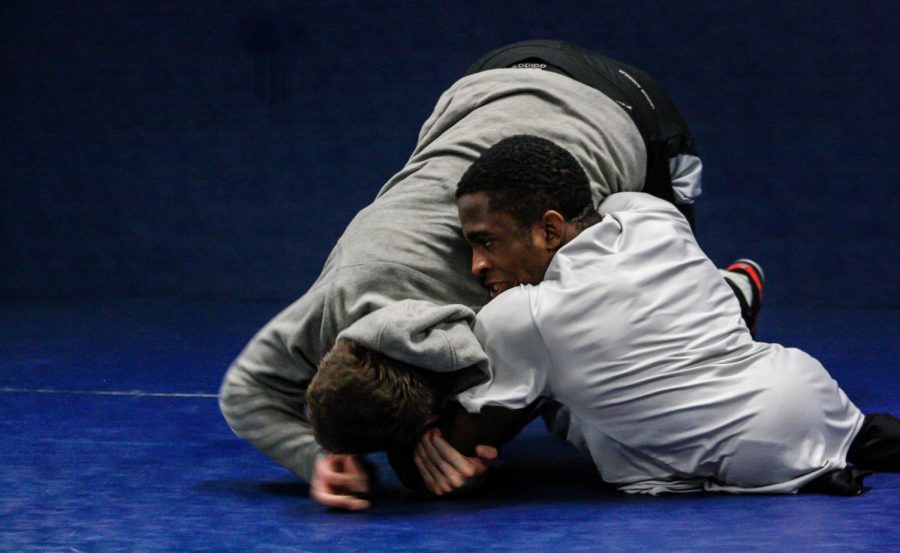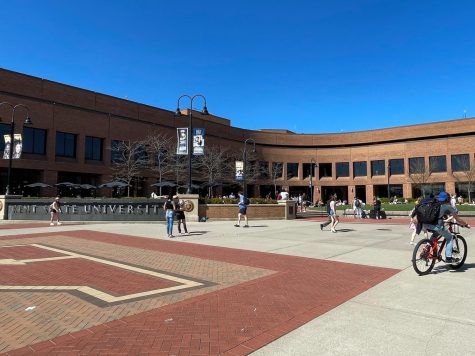Kent State Tuscarawas wrestler doesn’t let a condition define his life
February 6, 2018
One medical condition won’t define the life of Kent State Tuscarawas freshman Zion Clark.
The wrestler was born with a condition called caudal regression syndrome, a congenital disorder in which there is abnormal fetal development of the lower spine.
“My diagnosis hasn’t really affected my life good or bad, it’s just a day-to-day thing …” Clark said. “I just kind of figured out how to do a lot of things, like when it comes to riding a bike, I can do it.”
Around age eight, a teacher introduced Clark to a sport that would eventually impact his life forever: wrestling.
“My high school coach’s twin brother, who was my art teacher at the time, introduced me to it. I still remember the conversation pretty clearly,” Clark said. “He came up to me and asked ‘Have you ever heard of wrestling?’”
After that, the rest was history.
Clark was born in Columbus but raised in Massillon. Given up for adoption as a baby, Clark grew up moving around through the foster care system.
“When I was moving from home to home, there was a lot of bad things that happened,” Clark said. “At first, it affected me in a bad way. The more bad things that happened to me, the worse I started to act.”
It wasn’t until Clark’s senior year of high school he found his adoptive mother, Kimberly Hawkins.
“I was about to be kicked out of another home and was forced to move to Cincinnati or New York and I didn’t want to do that …” Clark said. “The agency reached out to my mom about adopting me and told her about a band concert I was playing in that night. I was the first chair trumpet player.”
He met his mother the night of his band concert. As soon as she laid eyes on him, she said yes to adopting him, Clark said.
Throughout Clark’s high school years, he finished with a career record of 33-15. Freshman and sophomore years, Clark won no matches. It wasn’t until his junior and senior years things started to improve.
“My junior year at the Smithville (Ohio) tournament, I hit a sloppy version of a move I’ve never done or tried before called a tilt,” Clark said. “The move worked, but I still ended up losing the match. I finally had something to base off of what I needed to start doing to get better. I just went from there, and after that a lot of things just started expanding.”
Beyond Kimberly, he relied on another person for guidance: his high school wrestling coach, Gil Donahue.
“I have known coach and his family for so long, back when I was really little,” Clark said. “I went to him for some consolation sometimes because there are some things you don’t want to talk to your mom about.”
Not only has Donahue made a major impact in Clark’s life, but Clark has forever changed the way Donahue looks at his perspective of life.
“You go through your ups and downs of being a human, and then you come to wrestling practice and look at a kid with no legs and his attitude,” Donahue said. “It is hard to not try and mock what he is doing and look at his aspect at life about having no excuses. How can I even act that way when I have two legs?”
Clark adopted the motto “no excuses” early in life. The phrase began when Clark read a book written by a congenital amputee, Kyle Maynard, titled “No Excuses.”
“I read the book when I was really little, and then I kind of used that for a little motivation,” Clark said. “Then coach kept reminding me of it throughout senior year of high school to really push myself to be better.”
Wrestling on the collegiate level was never a plan, Clark said. Kent State Tuscarawas reached out to Clark as a senior in high school. Uninterested, he declined the offer.
“I had no idea I was going to end up here, I had no idea I was going to end up anywhere,” Clark said. “Kent Tuscarawas got a hold of me and I kind of blew them off, but then I got a hold of Coach Schlarb and I reconsidered.”
Dave Schlarb is the head coach for the Kent State Tuscarawas wrestling team. Schlarb previously coached for New Philadelphia High School for 23 years, crossing paths with Clark on multiple occasions in high school.
“I don’t look at the things he has to do differently as a handicap, it is just things that have to be perfect,” Schlarb said. “He has to have things down and repeat it over and over again. He has limited moves, so they need to be perfect.”
Not only is Clark ranked nationally for wrestling, he is ranked as the 10th fastest 100-meter sprinter in the world for wheelchair racing.
“The year before, my sister, Indy, won a state title,” Clark said. “I was just out there watching her and these people approached me saying I would be really good at it.”
In 2017, Clark qualified to be a member of the Paralympic Nationals in California, taking home two state titles.
“I just tried the sport and I happened to be really good at it,” Clark said.
Clark is currently a member of Team USA’s B-Team with hopes of getting the gold for the A-Team in the 2020 Summer Paralympics in Tokyo.
“I like both sports, but wrestling is definitely my favorite …” Clark said. “I like to beat up on people. There is no other way to put it, it hasn’t changed since I was little. Who doesn’t think it is fun to beat up on someone?”
Along with wrestling and wheelchair racing, Clark taught himself how to play six different instruments: drums, guitar, piano, trumpet, ukulele and the bass guitar.
“I learned how to read music really young, so once I figured it out, if I could read this, I could play that,” Clark said.
There are three important matches of the season left for the Flashes, the most important being the National Collegiate Wrestling Association’s National Championship meet, which will be March 8-10 in Allen, Texas. Clark’s main focus for the upcoming meets is healing.
“There is something wrong with my ribs, but I am still wrestling with it,” Clark said. “I stubbed my wrists the other day, but it is healing up.”
To people who face obstacles, such as young athletes with a physical disability, just keep trying, Clark said.
“Some of the best people failed more than ever,” Clark said. “I mean, I lost all the time, a lot of important people have lost before they even picked up a skill. After that, once you get some traction you have to keep going.”
Brynn Pennell is the regional campuses reporter. Contact her at [email protected]
























